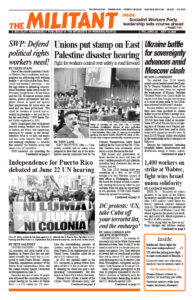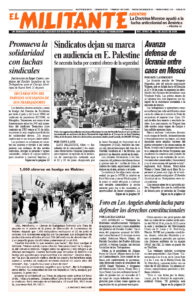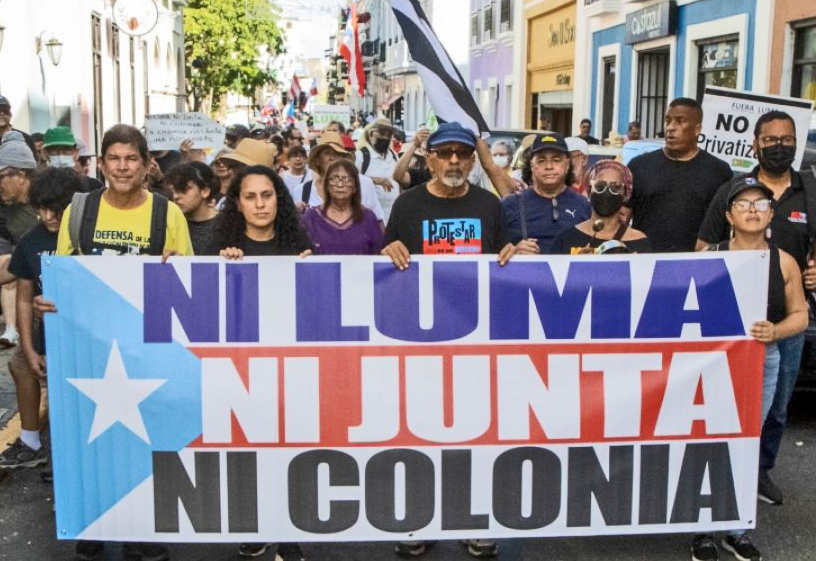UNITED NATIONS — “The political, economic and social model of colonialism in Puerto Rico has not only failed dismally, but every day it is rejected by more Puerto Ricans,” Adrián González, organization secretary of the Puerto Rican Independence Party, told the United Nations Special Committee on Decolonization June 22.
González was one of some 50 people who addressed the committee during its annual hearing on the status of Puerto Rico — a U.S. colony for 125 years. Like the overwhelming majority of speakers, mostly from Puerto Rico or from Puerto Rican organizations in the United States, González called for an end to U.S. colonial rule.
In 1953, the capitalist rulers in the U.S. succeeded in getting Puerto Rico taken off the U.N. list of colonies, falsely claiming the island was now a self-governing “commonwealth.” But few people in Puerto Rico believe that today.
Manuel Natal Albelo, a leader of the Citizen Victory Movement party, said that “illusion went up in smoke when the U.S. Congress in 2016 approved” the law that created the Financial Management and Control Board on Puerto Rico, known on the island as the Junta, empowered with veto power over all financial decisions of the colonial regime in San Juan.
The appointment of the unelected board by then-President Barack Obama — with the bipartisan support of Democrats and Republicans — is proof that “Puerto Rico does not govern itself,” said Mariana Nogales Molinelli, a member of Puerto Rico’s House of Representatives from the Citizen Victory Movement. “We don’t control the budget. The Junta imposes it.”
Numerous speakers described how the measures forced on Puerto Rico by the Junta are intended to ensure billions of dollars continue to be paid out to wealthy bondholders. This means less funds for social measures, worsening the already deteriorating economic and social conditions on the island, amid today’s worldwide capitalist crisis.
Washington’s colonial domination “is not an abstraction for the people of Puerto Rico,” said Ángel Rodríguez León, co-president of the National Hostosiano Independence Movement. It’s seen in the high levels of poverty, “in the pillaging of our natural resources, in the emigration of thousands of our compatriots to the United States, in the impossibility of taking the necessary measures to solve our problems” from health care to housing.
Several speakers pointed to the selling off of formerly public electric generation and distribution on the island to U.S. and Canadian-based companies. They tore up contracts with the electrical workers union and reap superprofits.
With tens of thousands of Puerto Ricans leaving every year, mainly to the U.S. mainland, and the birthrate declining to where it is now less than the death rate, the population is shrinking. There are some 5.8 million Puerto Ricans in the U.S. — more than the 3.2 million who remain on the island.
That’s why “Puerto Ricans in the diaspora will play a significant and determining role” in aiding the fight for Puerto Rican independence, Ana López, speaking for the New York-based Frente Independentista Boricua, told the committee. She pointed to the proud history of resistance by Puerto Ricans, both on the island and in the U.S., in opposing Washington’s colonial rule.
Myrna Pagán, from Viequenses Lives Matter on the island of Vieques, part of the Puerto Rican archipelago, noted, “We are celebrating the 20th year free of U.S. Navy bombing and military experimentation with depleted uranium, agent orange and napalm.”
After decades of protests by residents, fishermen and people across Puerto Rico, the U.S. Navy was finally forced to stop using Vieques as a bombing test range in 2003. But, Pagán noted, the U.S. government has still not cleaned up the site.
Not everyone testifying at the hearing backed the struggles of workers and farmers in Puerto Rico and the fight to end U.S. imperialism’s superexploitation of its colony.
Statehood vs. independence
More than a dozen participants, including members of the colonial government of Gov. Pedro Pierluisi and his New Progressive Party, spoke, claiming that the biggest problem is that residents of Puerto Rico are U.S. citizens “but aren’t allowed to vote for the commander in chief” — the president of the United States.
While admitting that Puerto Rico is a colony, they say the solution is for it to become the 51st U.S. state. José Enrique Meléndez, a PNP legislator in Puerto Rico, claimed independentistas are a tiny minority in Puerto Rico. Independence is being promoted by Cuba — the main author of the resolution before the Decolonization Committee that calls for self-determination for Puerto Rico — because it “is hostile to the United States” and wants to “weaken U.S. influence in the Caribbean and Latin America” and promote terrorists, he claimed.
Yuri Gala, the Cuban representative at the hearing, interrupted Meléndez. “Cuba is not hostile to the United States,” he said. “It’s the United States that is hostile to Cuba.”
For partisan reasons, Democrats in the U.S. back statehood for Puerto Rico, as well as for Washington, D.C., in hopes of winning a permanent majority in the Senate.
Some statehood proponents argued that the Puerto Rican people have voted in “democratic” referendums overwhelmingly in support of their stance.
Gabriela Malespín from New York Boricua Resistance answered this twisting of the truth. She noted that in 2017, most Puerto Ricans boycotted the nonbinding referendum on status, with only 23% of eligible voters participating. In 2020, only 55% of eligible voters participated. The official results of 52% for statehood “is far from a majority” of the eligible voters, she noted.
“True decolonization can only occur from the people of Puerto Rico,” Malespín said. “It requires that we abolish the fiscal control board and cancel the debt in its entirety.”
“Workers — in Puerto Rico, the U.S., and worldwide — have common interests and a common struggle,” said Rachele Fruit, speaking for the Socialist Workers Party. “Cuba’s revolutionary example shows the road to genuine freedom and independence for Puerto Rico, which will never be granted — it must be taken.”
At the conclusion of the hearing the Committee on Decolonization approved the resolution calling on the U.S. government “to allow the Puerto Rican people to fully exercise their inalienable right to self determination and independence.”


